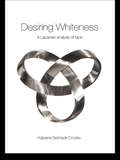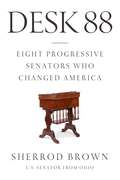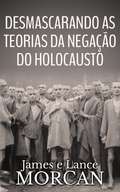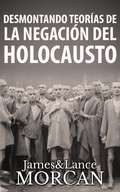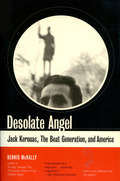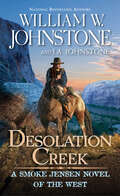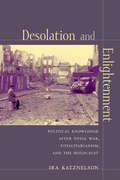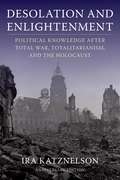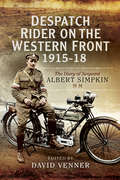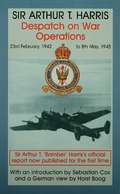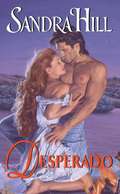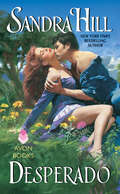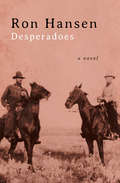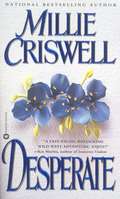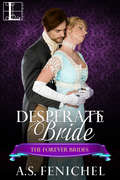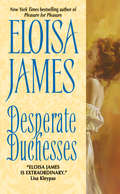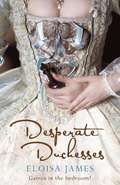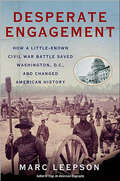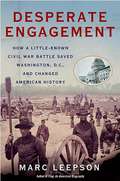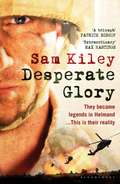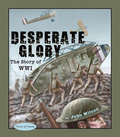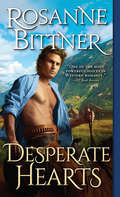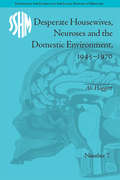- Table View
- List View
Desiring Whiteness: A Lacanian Analysis of Race (Opening Out: Feminism for Today)
by Kalpana Seshadri-CrooksDesiring Whiteness provides a compelling new interpretation of how we understand race. Race is often seen to be a social construction. Nevertheless, we continue to deploy race thinking in our everyday life as a way of telling people apart visually. How do subjects become raced? Is it common sense to read bodies as racially marked? Employing Lacan's theories of the subject and sexual difference, Seshadri-Crooks explores how the discourse of race parallels that of sexual difference in making racial identity a fundamental component of our thinking. Through close readings of literary and film texts, Seshardi-Crooks also investigates whether race is a system of difference equally determined by Whiteness. She argues that it is in relation to Whiteness that systems of racial classification are organized, endowing it with a power to shape human difference.
Desk 88: Eight Progressive Senators Who Changed America
by Sherrod BrownSince his election to the U.S. Senate in 2006, Ohio’s Sherrod Brown has sat on the Senate floor at a mahogany desk with a proud history. In Desk 88, he tells the story of eight of the Senators who were there before him. Despite their flaws and frequent setbacks, each made a decisive contribution to the creation of a more just America. They range from Hugo Black, who helped to lift millions of American workers out of poverty, to Robert F. Kennedy, whose eyes were opened by an undernourished Mississippi child and who then spent the rest of his life afflicting the comfortable. Brown revives forgotten figures such as Idaho’s Glen Taylor, a singing cowboy who taught himself economics and stood up to segregationists, and offers new insights into George McGovern, who fought to feed the poor around the world even amid personal and political calamities. He also writes about Herbert Lehman of New York, Al Gore Sr. of Tennessee, Theodore Francis Green of Rhode Island, and William Proxmire of Wisconsin. Together, these eight portraits in political courage tell a story about the triumphs and failures of the Progressive idea over the past century: in the 1930s and 1960s, and more intermittently since, politicians and the public have successfully fought against entrenched special interests and advanced the cause of economic or racial fairness. Today, these advances are in peril as employers shed their responsibilities to employees and communities, and a U.S. president gives cover to bigotry. But the Progressive idea is not dead. Recalling his own career, Brown dramatizes the hard work and high ideals required to renew the social contract and create a new era in which Americans of all backgrounds can know the “Dignity of Work.”
Desmascarando as Teorias da Negação do Holocausto
by Cassia Pereira James Morcan Lance MorcanDesmascarando as Teorias da Negação do Holocausto, por James Morcan e Lance Morcan com prefácio da sobrevivente do Holocausto, Hetty E. Verolme, visa acabar com o negacionismo de uma vez por todas ao abordar tal fenômeno absurdo. Escrito em estreita consulta com sobreviventes do Holocausto e historiadores da Segunda Guerra Mundial, aqui nenhuma pedra é poupada ao ser meticulosamente verificado os fatos históricos do genocídio. James e Lance Morcan apresentam uma vasta gama de fontes incluindo documentação nazista, relatos de testemunhas oculares, relatórios científicos e provas fotográficas chocantes para calar o debate que os negacionistas desejam criar. Um por um, dos vários argumentos que os negacionistas do Holocausto usam para tentar desacreditar os registros de guerra são cuidadosamente desmantelados e em seguida sistematicamente desmascarados. Entre as teorias a serem desmascaradas incluem: que o número de seis milhões de mortos é um exagero; extermínios câmaras de gás são fictícios; Adolf Hitler e o Terceiro Reich são indevidamente difamados; a análise de registros do Holocausto sendo um tabu devido a leis específicas na Europa que criminalizam os negacionistas; os "Sionistas do Mal" e Israel sendo tão poderosa, que eles podem censurar a história. O Holocausto é mostrado nas páginas deste livro como um dos mais bem documentados e historicamente mais comprovado crime do século XX. No processo, muitos dos mais famosos negacionistas do mundo, incluindo o desonrado historiador britânico David Irving e o ex-Presidente do Irã, Mahmoud Ahmadinejad, são revelados de serem nada mais do que antissemitas procurando denegrir, minar e desmoralizar a população judaica do mundo. Nesta esclarecedora leitura que cobre mais de dois milénios de história mundial, o antissemitismo é mostrado não apenas de ser a raiz de cada forma de negação do Holocausto, mas também a razão para a perseguição
Desmontando Teorías de la Negación del Holocausto
by Juliana Arango James Morcan Lance MorcanDescripción del Libro Desmontando Teorías de la Negación del Holocausto investigadores independientes y realizadores de cine James Morcan & Lance Morcan, con prefacio de la sobreviviente del Holocausto, Hetty E. Verolme (autora de The Children's House of Belsen), es una obra que pretende detener el Negacionismo de una vez por todas al hacerle frente al extraño fenómeno. Escrita con la colaboración de sobrevivientes del Holocausto y de historiadores de la Segunda Guerra Mundial, es una obra que no escatima detalles para análisis, de los hechos históricos del genocidio. Los Morcan presentan una gama amplia de fuentes, incluyendo documentación nazi, testimonios, informes científicos y evidencia fotográfica impresionante, con el fin de acabar con el debate que los negacionistas insisten en propiciar. Uno por uno, los variados argumentos que los negacionistas del Holocausto utilizan para tratar de desacreditar los registros de la guerra son examinados y luego, sistemáticamente desmentidos. Las teorías desmontadas incluyen: la cifra de seis millones de muertos puesta como una exageración; los exterminios en las cámaras de gas descritos como ficticios; Adolfo Hitler y el Tercer Reich mostrados como figuras inapropiadamente vilipendiadas; los análisis de los registros del Holocausto puestos como un tabú debido a leyes específicas en Europa que criminalizan a los negacionistas; “Sionistas malvados” y una Israel poderosa al punto de supuestamente poder manipular la historia. El Holocausto es mostrado en estas páginas como uno de los crímenes del Siglo 20 mejor documentados y comprobados desde el punto de vista forense e histórico. En el proceso, muchos de los negacionistas más infames del mundo, incluyendo al historiador británico David Irving y al antiguo presidente de Irán Mahmoud Ahmadinejad, son puestos en evidencia como nada más que antisemitas que pretenden denigrar, menoscabar y desmoralizar a la población judí
Desolate Angel: Jack Kerouac, The Beat Generation, And America
by Dennis McNally"A blockbuster of a biography . . . absolutely magnificent."--San Francisco ChronicleJack Kerouac--"King of the Beats," unwitting catalyst for the '60s counterculture, groundbreaking author--was a complex and compelling man: a star athlete with a literary bent; a spontaneous writer vilified by the New Critics but adored by a large, youthful readership; a devout Catholic but aspiring Buddhist; a lover of freedom plagued by crippling alcoholism.Desolate Angel follows Kerouac from his childhood in the mill town of Lowell, Massachusetts, to his early years at Columbia where he met Allen Ginsberg, William S. Burroughs, and Neal Cassady, beginning a four-way friendship that would become a sociointellectual legend. In rich detail and with sensitivity, Dennis McNally recounts Kerouac's frenetic cross-country journeys, his experiments with drugs and sexuality, his travels to Mexico and Tangier, the sudden fame that followed the publication of On the Road, the years of literary triumph, and the final near-decade of frustration and depression. Desolate Angel is a harrowing, compassionate portrait of a man and an artist set in an extraordinary social context. The metamorphosis of America from the Great Depression to the Kennedy administration is not merely the backdrop for Kerouac's life but is revealed to be an essential element of his art . . . for Kerouac was above all a witness to his exceptional times.
Desolation Creek (A Smoke Jensen Novel of the West #5)
by William W. Johnstone J.A. JohnstoneLegendary national bestselling Western authors William W. Johnstone and J.A. Johnstone return with the latest gun-blazing installment in their newest Smoke Jensen series.JOHNSTONE COUNTRY. WHERE DYING AIN&’T MUCH OF A LIVING. Building a ranch takes heart and grit. Smoke and Sally Jensen are more than capable of meeting the challenges of shaping the land, raising the livestock, and establishing their brand. But Smoke wasn&’t always an entrepreneur. He&’s more apt to settle accounts with a fast draw than a checkbook. And when he learns his old friend Preacher has been ambushed by outlaws, he wastes no time saddling up and hitting the vengeance trail with his fellow mountain men Audie and Nighthawk. Preacher&’s attackers have taken over the town of Desolation Creek deep in Montana Territory. Their scurrilous leader, Vernon &“Venom&” McFadden, has his men harrassing terrified homesteaders and townsfolk to get his hands on nearby property that&’s rumored to be rich with gold. Smoke and his helpmates drift into town one by one with a plan to root out Venom&’s gang of prairie rats and put the big blast on each and every one.
Desolation and Enlightenment: Political Knowledge After Total War, Totalitarianism, and the Holocaust
by Ira KatznelsonIn this major intellectual history, Ira Katznelson examines the works of Hannah Arendt, Robert Dahl, Richard Hofstadter, Harold Lasswell, Charles Lindblom, Karl Polanyi, and David Truman, detailing their engagement with the larger project of reclaiming the West's moral bearing.
Desolation and Enlightenment: Political Knowledge After Total War, Totalitarianism, and the Holocaust (Leonard Hastings Schoff Lectures)
by Ira KatznelsonDuring and especially after the Second World War, a group of leading scholars who had been perilously close to the war's devastation joined others fortunate enough to have been protected by distance in an effort to redefine and reinvigorate Western liberal ideals for a radically new age. Treating evil as an analytical category, they sought to discover the sources of twentieth-century horror and the potentialities of the modern state in the wake of western desolation. In the process, they devised strikingly new ways to understand politics, sociology and history that reverberate still. In this major intellectual history, Ira Katznelson examines the works of Hannah Arendt, Robert Dahl, Richard Hofstadter, Harold Lasswell, Charles Lindblom, Karl Polanyi, and David Truman, detailing their engagement with the larger project of reclaiming the West's moral bearing. In light of their epoch's calamities these intellectuals insisted that the tradition of Enlightenment thought required a new realism, a good deal of renovation, and much recommitment. This array of historians, political philosophers, and social scientists understood that a simple reassertion of liberal modernism had been made radically insufficient by the enormities and moral catastrophes of war, totalitarianism, and holocaust. Confronting their period's dashed hopes for reason and knowledge, they asked not just whether the Enlightenment should define modernity, but which Enlightenment we should wish to have. Decades later, in the midst of a new type of war and reanimated discussions of the concept of evil, we share no small stake in assessing their successes and limitations.
Desolation and Enlightenment: Political Knowledge After Total War, Totalitarianism, and the Holocaust (Leonard Hastings Schoff Lectures)
by Ira KatznelsonDuring and especially after World War II, a group of leading scholars who had been perilously close to the war’s devastation joined others fortunate enough to have been protected by distance in an effort to redefine and reinvigorate liberal ideals for a radically new age. Treating evil as an analytical category, they sought to discover the sources of twentieth-century horror and the potentialities of the modern state in the wake of desolation. In the process, they devised strikingly new ways to understand politics, sociology, and history that reverberate still.In this major intellectual history, Ira Katznelson examines the works of Hannah Arendt, Robert Dahl, Richard Hofstadter, Harold Lasswell, Charles Lindblom, Karl Polanyi, and David Truman, detailing their engagement with the larger project of reclaiming the West’s moral bearing. In light of their epoch’s calamities, these intellectuals insisted that the tradition of Enlightenment thought required a new realism, a good deal of renovation, and much recommitment. This array of historians, political philosophers, and social scientists understood that a simple reassertion of liberal modernism had been made radically insufficient by the enormities and moral catastrophes of war, totalitarianism, and the Holocaust. Confronting dashed hopes for reason and knowledge, they asked not just whether the Enlightenment should define modernity but also which Enlightenment we should wish to have.
Despatch Rider on the Western Front, 1915–18: The Diary of Sergeant Albert Simpkin MM
by David VennerThe colorful eyewitness-to-history diary of a young man who loved motorcycles—and used these new machines to serve his country in the Great War. This is the skillfully abridged version of the diary of a First World War motorcycle despatch rider, Sergeant Albert Simpkin, who was attached to the HQ 37th Division. The diary entries, and some longer descriptions of the main actions of the Division, provide a fascinating record of the life of a despatch rider on the Western Front—one day dodging shell holes and ammunition limbers to take his despatches to the front, the next observing the quaint but often courageous lives of the local populace. Throughout the diary are colorful and amusing anecdotes about his fellow soldiers, and critical comments on the strategies and tactics employed by the officers. &“It is worth seeking out and reading and if you are a fan of Great War motorbikes and vehicles this is a must.&” —War History Online
Despatch on War Operations: 23rd February 1942 to 8th May 1945
by Air Chief HarrisThis is the first time that Sir Arthur Bomber' Harris's own papers covering his three and a half years at Bomber Command have been published and made available to the general public. The book also contains an introduction by Sebastian Cox, an Air Staff Memorandum written immediately after the war and a revisionist German viewpoint by Horst Boog. It
Desperado
by Sandra HillPlaced in command of the only man to have shaken her firm self-control, chaste Major Helen Prescott warns Rafe Santiago to behave himself, but the two find themselves on the run when they are mistaken for outlaws.
Desperado
by Sandra HillMajor Helen Prescott always played by the rules. That's why Rafe Santiago nicknamed her "Prissy" at the military academy years before. But it wasn't just Rafe's teasing that got under her skin. His irresistible good looks made Helen lose control on one unforgettable night. So when a stint in the National Guard brings Rafe under her command, she not only lays down the law with him, but swears to herself she'll resist him. When a routine skydive goes horribly wrong, all bets are off as they find themselves parachuting back in time to the 1850 California Gold Rush.Mistaken for a notorious bandit and his infamously sensuous mistress, Rafe and Helen are now on the wrong side of the law. As they try to stay one step ahead of the authorities, they surrender to temptation. But will their desire be strong enough to keep them together if they ever find their way back to the present . . . ?
Desperadoes: A Novel
by Ron HansenRon Hansen&’s engrossing novel of the violent life and criminal exploits of the Dalton gang, as remembered by its last surviving memberFrom his home in Los Angeles, an aging Emmett Dalton reminisces about his glory days in America&’s Wild West. Now sixty-five years old, and a Hollywood fixture, he makes a comfortable living selling stories of his earlier exploits to movie studios. But years before, he rode with his two brothers—charming, handsome, charismatic Bob, and the cold-eyed killer Grat, so wild and unpredictable that even his own family was afraid of him—committing brazen acts of robbery, bootlegging, and murder. As the last surviving member of the infamous Dalton gang, it&’s Emmett&’s responsibility to keep their legend alive. He has resolved to tell the full truth about the fabled career of the three criminal brothers and Eugenia Moore, the former schoolmarm who was an indispensable partner in their crimes, even if that truth turns out to be a darker, more painful, and less heroic picture than Hollywood&’s moguls would make it out to be. The critically acclaimed debut novel by bestselling author Ron Hansen, Desperadoes is a masterwork of historical fiction that brings a fabled era of American outlaws and violence to breathtaking life.
Desperate
by Millie CriswellEx-Texas Ranger Rafe Bodine, thought he could leave his violent past behind him and settle down with his childhood sweetheart. But when she is murdered, that dream is shattered. Now Rafe is on a mission of revenge. He doesn't count on meeting Emmaline St. Joseph, however, a headstrong philanthropist who needs Rafe's help. When Rafe reluctantly agrees, they both discover how to survive in the wilderness and trust their lives to one another--discovering a desire that transforms their world.
Desperate Bride (Forever Brides #3)
by A. S. FenichelAn unexpected promise . . . an everlasting passion. An accomplished musician, Dorothea Flammel has refused more proposals than any London debutante; her only true love is her music. Dory’s shimmering talent and beauty have long been adored from afar by Thomas Wheel, an untitled gentleman who can only dream of asking for the hand of a nobleman’s daughter. But when her father, the insolvent Lord Flammel, arranges for Dory to marry a lecherous Earl in order to pay off a debt, she runs to Thomas—and proposes marriage to him. Eloping to Scotland saves Dory from a disastrous fate, but what is for her a mere marriage of convenience proves more passionate—and more complex—than either imagined as rumors, scandal, and buried emotions come to light. And when a vengeful challenge from a drunken and embittered Lord Flammel puts Thomas’s life on the line, will the fragile trust between husband and wife be enough to save them both?
Desperate Duchesses
by Eloisa JamesWelcome to a world of reckless sensuality and glittering sophistication . . . of dangerously handsome gentlemen and young ladies longing to gain a title . . . of games played for high stakes, including--on occasion--a lady's virtue.A marquess's sheltered only daughter, Lady Roberta St. Giles falls in love with a man she glimpses across a crowded ballroom: a duke, a game player of consummate skill, a notorious rakehell who shows no interest in marriage--until he lays eyes on Roberta.Yet the Earl of Gryffyn knows too well that the price required to gain a coronet is often too high. Damon Reeve, the earl, is determined to protect the exquisite Roberta from chasing after the wrong destiny.Can Damon entice her into a high-stakes game of his own, even if his heart is likely to be lost in the venture?
Desperate Duchesses: A Steamy and Pageturning Regency Romance Book
by Eloisa Jamesfont size="+1">'Nothing gets me to a bookstore faster than Eloisa James' Julia Quinn, bestselling author of Bridgertons The first book in the New York Times bestselling Desperate Duchesses series, perfect for fans of Julia Quinn's Bridgertons and Eloisa's Wildes of Lindow Castle'Choc-full of romantic heroes romantic heroes that would give Darcy a run for his money.' Carole MatthewsSpring 1783 . . . Jemma, Duchess of Beaumont, has just returned from Paris and is planning to shock all of London High Society - not to mention horrify her estranged husband - with scandalous soirees and a debauched grand ball.But irritating her husband comes naturally, and she needs a challenge. When her country cousin Lady Roberta St. Giles asks for help seducing the Duke of Villiers into marriage, Jemma jumps at the chance. She transforms Roberta into the most delicious and desirable woman in town. Then she lures Villiers to the house, ostensibly to play chess.But the plan backfires. Villiers responds enthusiastically to Jemma's challenge and, ignoring Roberta or indeed Jemma's husband, offers her a match - three games, the last of which is to be played blindfolded. And nude.And in bed.
Desperate Engagement: How a Little-Known Civil War Battle Saved Washington, D.C., and Changed American History
by Marc LeepsonThe Battle of Monocacy, which took place on the blisteringly hot day of July 9, 1864, is one of the Civil War's most significant yet little-known battles. What played out that day in the corn and wheat fields four miles south of Frederick, Maryland., was a full-field engagement between some 12,000 battle-hardened Confederate troops led by the controversial Jubal Anderson Early, and some 5,800 Union troops, many of them untested in battle, under the mercurial Lew Wallace, the future author of Ben-Hur. When the fighting ended, some 1,300 Union troops were dead, wounded or missing or had been taken prisoner, and Early---who suffered some 800 casualties---had routed Wallace in the northernmost Confederate victory of the war.Two days later, on another brutally hot afternoon, Monday, July 11, 1864, the foul-mouthed, hard-drinking Early sat astride his horse outside the gates of Fort Stevens in the upper northwestern fringe of Washington, D.C. He was about to make one of the war's most fateful, portentous decisions: whether or not to order his men to invade the nation's capital. Early had been on the march since June 13, when Robert E. Lee ordered him to take an entire corps of men from their Richmond-area encampment and wreak havoc on Yankee troops in the Shenandoah Valley, then to move north and invade Maryland. If Early found the conditions right, Lee said, he was to take the war for the first time into President Lincoln's front yard. Also on Lee's agenda: forcing the Yankees to release a good number of troops from the stranglehold that Gen. U.S. Grant had built around Richmond.Once manned by tens of thousands of experienced troops, Washington's ring of forts and fortifications that day were in the hands of a ragtag collection of walking wounded Union soldiers, the Veteran Reserve Corps, along with what were known as hundred days' men---raw recruits who had joined the Union Army to serve as temporary, rear-echelon troops. It was with great shock, then, that the city received news of the impending rebel attack. With near panic filling the streets, Union leaders scrambled to coordinate a force of volunteers.But Early did not pull the trigger. Because his men were exhausted from the fight at Monocacy and the ensuing march, Early paused before attacking the feebly manned Fort Stevens, giving Grant just enough time to bring thousands of veteran troops up from Richmond. The men arrived at the eleventh hour, just as Early was contemplating whether or not to move into Washington. No invasion was launched, but Early did engage Union forces outside Fort Stevens. During the fighting, President Lincoln paid a visit to the fort, becoming the only sitting president in American history to come under fire in a military engagement.Historian Marc Leepson shows that had Early arrived in Washington one day earlier, the ensuing havoc easily could have brought about a different conclusion to the war. Leepson uses a vast amount of primary material, including memoirs, official records, newspaper accounts, diary entries and eyewitness reports in a reader-friendly and engaging description of the events surrounding what became known as "the Battle That Saved Washington."
Desperate Engagement: How a Little-known Civil War Battle Saved Washington, D.C., and Changed American History
by Marc LeepsonThe July 9, 1864, Battle of Monocacy is one of the Civil War's most significant, yet little-known, battles. What played out that day in the corn and wheat fields near Frederick, Maryland, was a full-field engagement between 12,000 battle-hardened Confederate troops led by the controversial Jubal Early, and 5,800 Union troops, many of them untested in battle, under the mercurial Lew Wallace, best known as the author of Ben Hur. When the fighting ended, some 1,300 Union troops were dead, wounded, or captured, and Early- who suffered some 800 casualties- had won the northernmost Confederate victory of the war. Two days later, Early sat astride his horse outside the gates of Fort Stevens in the upper northwestern fringe of Washington, D.C. He was about to make one of the war's most fateful decisions: whether or not to invade the under-defended nation's capital. There was near panic in the streets when Washington learned of the impending Rebel attack. But Jubal Early did not pull the trigger, giving General Ulysses S. Grant just enough time to bring thousands of veteran troops up from Richmond. Historian Marc Leepson uses memoirs, diaries, and other primary sources in a reader-friendly and engaging retelling of the events surrounding what became known as "the Battle that Saved Washington," its impact on the last nine months of the Civil War, and on the course of American history.
Desperate Escape (Fountas & Pinnell Classroom, Guided Reading)
by Margie Sigman Dongjun LeeNIMAC-sourced textbook. Refugee Boat. Thoi and June have left war-torn Vietnam in 1978 and, as refugees, are hoping for a better life in a new place. But first they have to survive some frightening perils at sea.
Desperate Glory: At War in Helmand with Britain's 16 Air Assault Brigade
by Sam KileyIn the dust and blazing heat of Helmand, the young men of 16 Air Assault Brigade find themselves in the most relentless battles faced by British troops in recent history. As the only writer to have obtained unprecedented, unrestricted access to the front line, Sam Kiley is with them to bear witness to the most intense challenges of their lives. It is an unflinching portrait of the reality of war-the bombs, the shooting and the daily struggles that push them to the very limit of human endurance.
Desperate Glory: The Story of WWI
by John WilsonShort-listed for the 2009 Red Maple Award for Non-Fiction, OLA Forest of Reading and commended for the 2009 OLA Best Bets This book presents the story and issues of the First World War in a clear, concise and objective manner, accompanied on every page by photographs, original sketches or maps. Focussing on social as well as political issues with a Canadian perspective, Wilson presents the issues of the war with depth and compassion. This book will be a very useful tool for educators in explaining the hows and whys of this most important period.
Desperate Hearts
by Rosanne Bittner"One of the most powerful voices in western romance returns with a gritty, earthly, moving love story that captures the true spirit of the West." -RT Book Reviews, review for Paradise ValleySHE'S A WOMAN WITH A SECRETElizabeth Wainwright is on the run. Accused of a murder she didn't commit, she has no choice but to cut ties with her old life and flee West. The last thing she wants is attention, but when her stagecoach is attacked, she suddenly finds herself under the fierce protection of one of Montana's famed vigilantes...whether she likes it or not.HE'S A MAN WITH A CODE Lawman Mitch Brady is sworn to uphold justice in the wild lands of 1860's Montana. He's never met a man he's feared, and he's never met a woman more desperately in need of his help. Something's shaken the secretive Elizabeth, but as he gets to know the beautiful city belle, he finds the only thing he wants more than her safety...is her trust.
Desperate Housewives, Neuroses and the Domestic Environment, 1945–1970 (Studies for the Society for the Social History of Medicine #7)
by Ali HaggettAlthough the figure of the ‘desperate housewife’ is familiar to us, Haggett suggests that many women in the 1950s and ’60s led satisfying lives and that gender roles, while very different, were often seen as equal.
